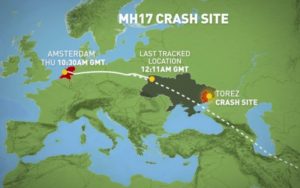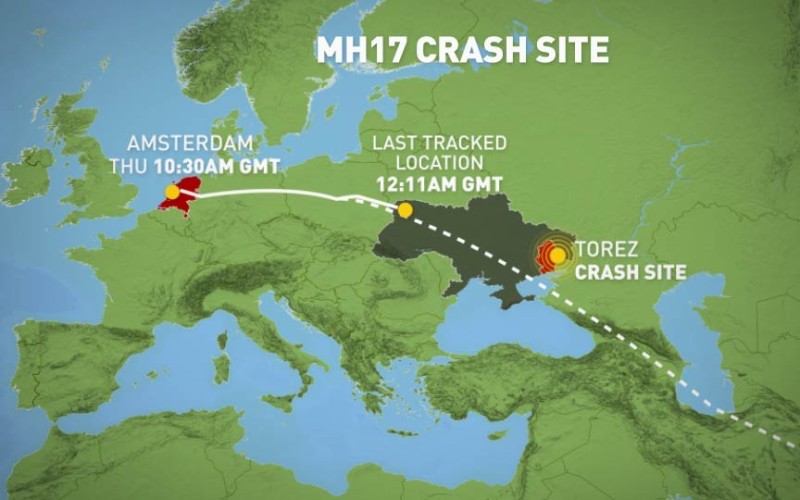
On July 17, 2014 Malaysia Airlines Flight MH17 was shot out the sky at 33,000 feet above eastern Ukraine killing all 298 people on board. The cause of the 298 deaths can be attributed to the fighting between Ukraine and pro-Russian rebels during the Crimean crisis. However, it has not been confirmed whether the Ukrainian military or the pro-Russian rebels shot the SA-11 missile at the airline and both sides have denied responsibility for the deaths. Although there is evidence pointing to the rebels being the ones to have fired the missile, which may have been provided to the rebels by Russia, the crash site was initially closed off to the international investigators by the rebels. Therefore, there remains speculation and controversy as to what actually happened to flight MH17.
The lack of certainty of who caused this horrific tragedy has led Malaysia and the Netherlands to propose the creation of an international tribunal to investigate and prosecute those suspected of causing the crash. Malaysia and the Netherlands are the primary countries backing the resolution as the airline was Malaysian and the majority of passengers who died were Dutch. The vote to create the tribunal is set to go before the United Nations Security Council on July 29, 2015. While all want answers to what happened to flight MH17, there may be an issue as to whether an international tribunal could ever be created. The issue comes with the veto power that each permanent member of the Security Council has, as the creation of an international tribunal must be decided through the Security Council and not the General Assembly. The power to create a criminal tribunal, which was exercised with the creation of the Criminal Tribunals of the former Yugoslavia and Rwanda, comes from Chapter VII of the United Nations Charter. Article 39 of Chapter VII gives the Security Council the power to take measures they deem fit to maintain and restore international peace and security. Therefore, in order to have an international tribunal for flight MH17, all five permanent members of the Security Council must vote yes for its creation. The issue is whether Russia will exercise its veto when the resolution comes to the table.
The positives of a creation of an international tribunal for flight MH17 far outweigh the negatives. A major negative is that an international tribunal will take years to investigate and prosecute, as seen with the International Criminal Tribunal for the former Yugoslavia. The real downside to the creation of a tribunal is that it takes away sovereign power from Ukraine to have the case heard nationally. Yet, if Ukraine were to try the case internally, Ukraine would not have power over the pro-Russian rebels as the Crimea is annexed nor would Ukraine have power over Russia if it were found that Russia supplied the weapon that shot down MH17. Therefore, the best option would be an international tribunal.
An international tribunal would be an effective way of revealing what actually happened and what specifically took down the flight. Since there is doubt as to what took place on July 17th, which can be somewhat attributed to the fact the pro-Russian rebels closing off the crash site for a few days after the crash, and denial by all parties involved, a tribunal would allow the international community to have peace of mind in knowing that the truth was out in the open. The tribunal would also provide closure to the families of the victims because they would finally know all the details, while painful, of how and why they lost their loved ones.
A tribunal would give the families of the victims a chance to be heard. By allowing the families to testify, the case will be humanized. While emotion should not sway a judge in his or her ruling, the humanization would make the deaths no longer just a number but 298 individual people who were wrongly killed. The deaths of each victim should not be forgotten.
A tribunal may also have some deterrent effect and may dissuade others from committing similar acts during times of war and conflict. States need to know that while they are entitled to sovereignty, they must be careful with internal conflicts and the repercussions outside of the state. The tribunal may also have an effect on ensuring that airways are restricted over states that are experiencing internal conflicts. If the airways had been restricted over Ukraine last summer, this tragedy would not have occurred. Now while the restriction of airspace will have economic and travel consequences, which may make many states and international corporations upset, it will save lives.
Whether or not a tribunal is established, the facts surrounding the downing of flight MH17 and the 298 deaths need to be heard. The one missile that took 298 innocent lives needs to be answered for.
Teresa Milligan is a 3L law student at the University of Denver Sturm College of Law and the Editor-in-Chief for the Denver Journal of International Law and Policy.


